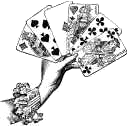Schell's discard tables
![]()
 |
|
These are the static discard tables I use in
my own play and analysis. When I prepare for serious competition, I memorize
these values rounded to one decimal point. Then I use them in conjunction
with the addition method and other
techniques to help guide me through difficult discarding decisions over the
board.
My figures are based on the discard tables compiled by Hessel, Rasmussen and Bowman (the latter being reprinted by Colvert in his book Play Winning Cribbage). The Hessel and Bowman numbers (which are computer-generated) are averaged together at par, while the Rasmussen numbers (which are sampled from actual human play) are averaged in as a square root of the number of samples, which is different for each discard combination. Discarding to your crib (Schell)
Discarding to opponent's crib (Schell)
These tables are a distillation of three sets of original figures, each of which was generated with a different methodology. I think they quite accurately reflect current cribbage praxis, and they have served me well in expert-level play. For more information on how to use and interpret these tables, see the articles Discarding to your crib and Discarding to opponent's crib. - February 2002 |
![]()
![]() prior
article | Cribbage Forum home |
next article
prior
article | Cribbage Forum home |
next article![]()
Schellsburg home
![]()
Cribbage Forum features articles on cribbage strategy and tactics
by Michael Schell.
Original Material and HTML Coding Copyright © 2002 by Michael Schell. All Rights
Reserved.